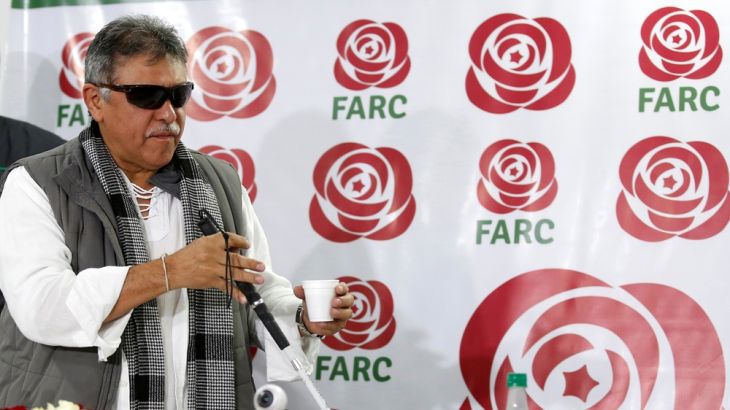Colombia arrests FARC leader on drug trafficking charge
Jesus Santrich was arrested in Bogota on charges of planning to smuggle $320m worth of cocaine to the US.

A former top FARC leader has been arrested in Colombia on charges of planning to smuggle 10 tonnes of cocaine to the United States, potentially putting Colombia’s peace process with the rebel group under heightened pressure.
The surprise arrest of Seuxis Hernandez, better known as Jesus Santrich, at his Bogota residence on Monday came at the request of the US.
Keep reading
list of 4 itemsColombia agrees with ELN rebel group to extend truce
Amid uptick in kidnappings, Colombian family receives ‘biggest gift of all’
Her son was killed by the Colombian military. Now, she’s getting an apology
Santrich and three co-conspirators who were also detained were indicted by a New York grand jury for allegedly planning to traffic a cocaine shipment with a street value of $320m to the US.
He was accused of meeting cocaine buyers in his Bogota residence on November 2 to discuss the shipment.
The 51-year-old was one of the negotiators of the Revolutionary Armed Forces of Colombia (FARC) during peace talks in Havana, Cuba, which led to FARC transforming itself into a political party.
Santrich was due to take one of 10 seats in Congress that were guaranteed to the FARC political party as part of the peace deal in July.
Colombian President Juan Manuel Santos said in a televised address that his “hand wouldn’t shake at the authorisation of his extradition” if irrefutable proof for the allegations exists, in order to protect the integrity of the peace deal signed in November 2016.
Under the agreement, FARC fighters who demobilise and confess to war crimes would be spared jail time and extradition, but this protection does not extend to crimes committed after the peace deal was ratified.
‘Disastrous demoralising message’
“This is the worst moment that the peace process has gone through,” the former rebel leader and chief peace negotiator known as Ivan Marquez said, according to The Associated Press.
Former rebels and FARC sympathisers gathered outside the prosecutors’ bunker on Monday demanding Hernandez’s release.
“This is extremely serious, because it sends a very disastrous demoralising message that creates a lot of uncertainty,” Chucho Narinho, a FARC regional leader, told reporters. “It’s a very bad message for the Colombian people, for the former combatants and for the peace that our country so badly needs.”
The peace deal, which put an end to a civil war that lasted more than half a century and killed more than 220,000 people, has been under pressure as many Colombians think it was too lenient towards former rebels who have committed atrocities.
Conservative parties which were opposed to the peace deal came out ahead in parliamentary elections in March.
FARC performed poorly in the election, garnering less than 0.4 percent of the vote for Senate and less than 0.3 percent in the lower house.
Ivan Duque, who was against the peace deal, is leading polls for a presidential election set to take place on May 27.